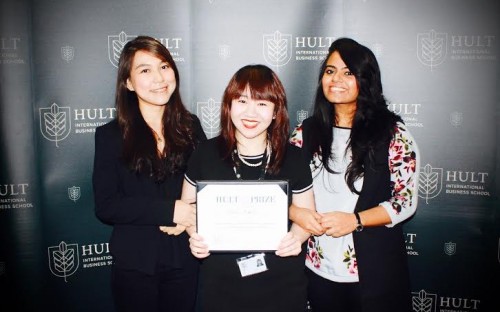Founded in 2009 by Hult graduate Ahmad Ashkar, the Hult Prize fosters the creation of for good, for profit businesses to tackle global issues. This year’s theme – ‘Refugees - Reawakening Human Potential’ – focuses on restoring the rights and dignity of the world’s 60 million-to-one billion refugees.
Gopi Bhudia, captain of the winning ‘Team Faeth,’ came up with the idea for the ‘E-Vacuate’ app on a trip to India. There, she was inspired by the trend of demonetization and the opportunity to take digital payments to rural consumers.
“We decided to target migrating refugees by providing them a digital wallet with additional features to encourage legal transition through their journey,” says Gopi, who worked on the project together with fellow Hult Master of International Business (MIB) students Jercyl Uy and Dayana Azman Wong.
“We want to create a sustainable social enterprise model that is scalable,” she continues. “We intend to create awareness about the plight of refugees. In the future, we hope to create a pathway to people who want to help the refugees through digital gifts or donations.”
The refugee cycle has been re-defined into four stages; pre-movement, in-motion, temp relocation, and permanent status. In partnership with former President Bill Clinton and Hult, the Hult Prize Foundation aims to reach 10 million displaced people by 2022.
On Hult’s London campus on December 10th, Gopi, Jercyl and Dayana, beat off competition from 16 teams of business masters and MBA students to advance to the competition’s next stage.
The event’s organizer, Hult’s global head of alumni relations Jean de Villeneuve Bargemont, sat on the judging panel.
“This is the hardest and most ambitious challenge ever set in the Hult Prize, in a relatively untapped field,” he says. “We’ve had a fantastic diversity of competing teams, from MIB to EMBA students, and Team Faeth are deserved winners.”
Fellow judge Anthony Murphy agrees. Anthony is director of Prime Advocates, a nonprofit social finance consultancy which runs a student initiative helping student-run enterprises to scale.
“Team Faeth’s idea has an immediate impact on the in-motion stage of the migration cycle. And it proposes a solution to a number of problems that migrants face, across the different stages,” he says.
“These Hult students are very talented individuals,” he continues. “We’ve been humbled by their enthusiasm for social enterprise.”
Gopi and her teammates are understandably delighted with their victory, and are already looking ahead to next competition’s next stage.
In March 2017, they will attend the regional semi-finals, held at Hult’s international campuses in London, Boston, San Francisco, Dubai and Shanghai.
If they’re successful, they’ll enter the six-week Hult Prize startup accelerator in Boston before competing for $1 million in seed capital at the grand final in New York in September.
“The Hult Prize is a great platform for turning passionate people into social entrepreneurs,” says Gopi. “By taking part, we’re actively voicing our message out to the world that enough is enough; it’s time to take a stand.
“For us, the Hult Prize has and will continue to open up a world of insightful mentorship, philanthropic connections, and a dream we intend to make a reality.”
RECAPTHA :
e3
6a
58
3f








